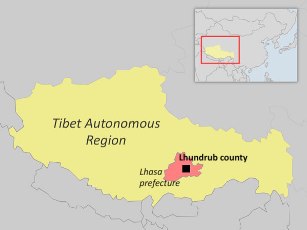Holding the Chinese national flag and carrying photos of Chinese national leaders, Tibetan farm women marched this week outside Tibet’s regional capital Lhasa to protest the confiscation by authorities of their farmland, sources in the region and in exile said.
Over 100 women from Gachoe village in the Tibet Autonomous Region’s Lhundrub (in Chinese, Linzhou) county protested in front of county offices on June 13, a source living in the area told RFA’s Tibetan Service.
“They carried photos of five Chinese leaders and a national flag and marched through the streets, shouting,” RFA’s source said, speaking on condition of anonymity.
“Only women participated in the protest out of fear that Chinese police would crack down on any men taking part,” he said.
Tibetan farmers have been driven to desperation by authorities’ confiscation of their land, with amounts paid in compensation far less than the amounts originally offered, he said.
“The Chinese authorities had promised to compensate the farmers at the rate of 200,000 yuan [U.S. $30,352.] for each mu of land, but they have only been given about 20,000 yuan [U.S. $3,035]per mu,” the source said, adding that the farmers are now demanding at least 180,000 [U.S. $27,316] yuan per mu.
“So they are calling out now for proper compensation, and are shouting that Chinese development plans will drive them into poverty for generations to come,” he said.
New cities planned
Also speaking to RFA, a Tibetan source living in India confirmed that Tibetan farmers in Lhundrub county are being driven to protest because of Chinese moves to take away and destroy their fields.
“New cities are being built in the area, and the farmers are being tricked in various ways into giving up their land,” the source said, citing contacts in the Lhundrub area.
In December, RFA sources reported that Chinese authorities had ordered the destruction of houses built in traditional style in Lhundrub and two other counties outside Lhasa, with their replacement by Chinese-style dwellings scheduled for completion in five years.
Demolition and construction was set to begin this year in Lhundrub, Tagtse (Dazi), and Maldro Gongkar (Mozhugongka) counties, one resident of the area, speaking on condition of anonymity.
“We are being forced to accept and support the plan without any choice,” the source said.
| Themes |
| • Advocacy • Displaced • Displacement • ESC rights • Forced evictions • International • Land rights • People under occupation • Security of tenure • Solidarity campaign • Tribal peoples |














